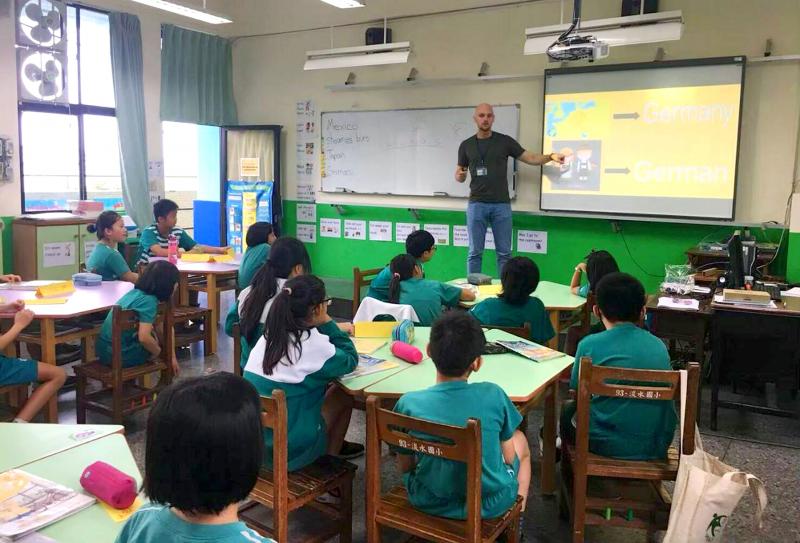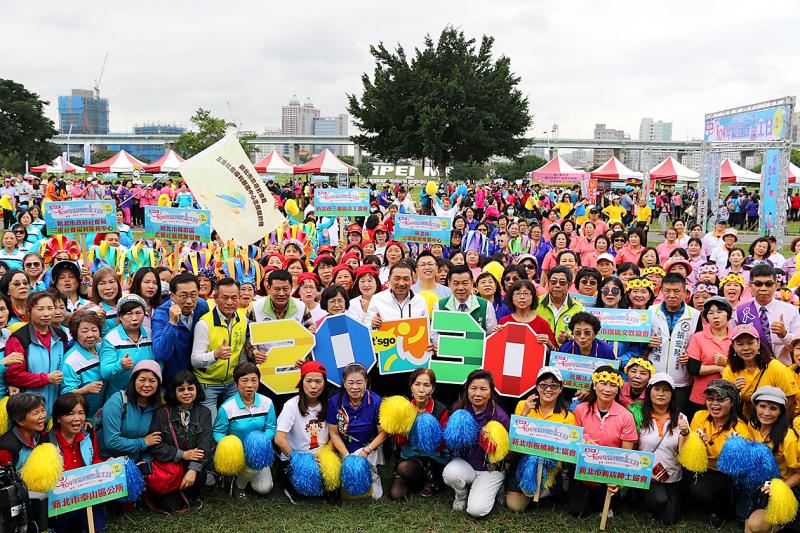“Everybody AA AAAA BBBB CCCC” went a lighthearted rap song by Ziyou Fahui (自由發揮) that spoofed English-language learning in Taiwan a few years ago. A video for the song opens with young people attempting to pronounce English words (and failing humorously) in fine Taiwan style. It’s somehow fitting that rap, a globalized, hybridized musical form, was used to sing about another globalizing force, English learning in Taiwan.
The government’s goal of making Taiwan a fully bilingual nation by 2030 by investing in hiring foreign English teachers for locals, among other policies, has generated strong responses from commentators and from society.
One well-known site hosted a piece arguing that the policy should not be wide-ranging, but instead carried out through the educational system, as if the government hadn’t proposed hiring hundreds of foreign English teachers each year to staff the over 3,800 elementary, junior high, high school and vocational institutions, and as if English classes hadn’t started with the third grade in many elementary schools nearly two decades ago.

Photo: Chou Hsiang-yun, Taipei Times
WIDE-RANGING PROGRAMS NEEDED
In fact, what is called for is a wide-ranging policy, one that encompasses not only the educational system but all the facets of life in which people may interact in English, from museum exhibits to banks to emergency services. Of course, the government is well aware of this. English policy in Taiwan has long been wide-ranging, with the government quietly investing in many different programs.
For example more than 15 years ago the old Research, Development and Evaluation Commission (RDEC) commenced a multi-year program of sending native speakers to thousands of businesses, service institutions such as hospitals, clinics, taxi firms and tourist sites across Taiwan to evaluate their spoken English and their signage, and suggest improvements. Many foreigners in Taiwan were part of this effort.

Photo: Chou Hsiang-yun, Taipei Times
At both the local and central government levels there have been periodic spasms of English language upgrade policies for the bureaucracy, or programs like former Taichung mayor Jason Hu’s (胡志強) 2008 idea of using local missionaries to spot signs in need of correction.
“To be an international city, we must have accurate English signs,” Hu observed.
Tainan once hired a foreigner for a similar task. If Taiwan is going to be a bilingual country by 2030, sustained efforts like that will be needed, because long-term change is slow, tedious work.
Why is Taiwan implementing this massive program to make the nation bilingual within a decade? I believe two forces are driving this.
WEEDING OUT
One is the fear of being weeded out. Taiwanese internalize this early: the educational system, run on testing, functions as a weeding-out system. People send their children to cram schools not because of the educational system’s presumed lack of educational resources (cram schools are far less well equipped) but out of fear that their children will be weeded out.
The media constantly reinforces this fear by breathlessly informing Taiwan of its position in the latest and largely meaningless international rankings. Comparisons to places like Japan, South Korea and Singapore are particularly potent. Schools of all types publicly post information on students who have done well, another of the many manifestations of Taiwan’s obsession with rank.
English is naturally no exception. A few months ago a National Taiwan Normal University (NTNU) study found that Taiwan lagged behind China, South Korea and Japan in class hours and vocabulary taught. Apparently we’re just not brutal enough here. This is an old theme: a quick Google search will turn up articles going back 20 years complaining that Taiwanese score more poorly on international tests and bitterly lamenting the nation’s poor English.
Contrast that with the lived experience of Taiwan, where it is not difficult to get around entirely in English, something tens of thousands of tourists used to do before COVID-19. Documents and signs in multiple languages are common in large organizations, tourist sites, museums and government offices.
Hence, in applying this policy, widely perceived as too ambitious (as Isabel Eliassen and Timothy Rich argued in a piece last year “…the government might consider setting 2030 as a date for comprehensive policy, rather than saying that Taiwan will be bilingual at that point”), the one question no one is raising is “how much English is enough?” Once that question is asked, the pointlessness of being “bilingual” in English becomes obvious.
A HUNGER FOR MODERNITY
The other force driving this policy is Taiwan’s ardent desire to be seen, not just as a nation, but as a modern nation. Recall Hu’s words: “To be an international city…”
In the process of colonization, the colonizer presents itself to its subject peoples as a modernizing power and teaches them that they are “backward” peoples in need of modernity. It’s as if, having absorbed that lesson from multiple colonizers over the centuries, Taiwan has incorporated that need into its own identity. As a friend of mine pithily puts it, Taiwan is a nation with the heart of a province.
Much social action springs from that desire. Why did Taiwanese politicians from across the political spectrum embrace the LGBT movement after 2000? Because they wanted to appear modern. Remember 1995’s Asia Pacific Regional Operations Center (APROC) policy, always approaching but never arriving? That was presented as “modernizing” policy that would keep Taiwan in the competition against Singapore and South Korea. Ditto for the “Bilingual by 2030” policy.
That strange paradox of seemingly progressive policies such as gay marriage in a nation that is obviously not progressive can, in part, be explained by that yearning to be “modern.” Outside observers who are already “modern” perceive such policies to be progressive, since that is the only frame they have for them.
Globalization operates like a colonial program, shoving aside what is local and unique and replacing it with a standardized, internationalized modernity brought in from the outside. It is hardly surprising, given Taiwan’s yearning to be modern, that the government is pushing for bilingualism in English. After all, it is the language of contemporary globalized modernity, the ultimate symbol that one has become modern.
Bilingual by 2030 will of course fail. For one thing, the educational system is almost immune to deeply-needed change, pressured from without by parents desperate to avoid having their children weeded out, constrained from within by a test-oriented approach that socializes children into long hours of work and acceptance of the idea that their time is always under someone else’s control.
More fundamentally, English is unnecessary for most Taiwanese, giving them little incentive to learn it, while those who need English for some purpose can easily find people to provide it, training to cultivate it or work-arounds like translation programs.
Eliasson and Rich are right. The government needs to redefine the effort as a comprehensive set of policies with clearly and narrowly-defined goals. And at all levels, Taiwan needs to rethink what it means to be “modern” and how it handles its engagement with the globalized world economy and its powerful cultural forces.
Because as Ziyou Fahui put it: “我要創造一首英文歌, 我要international (I want to create an English song, I want international).”
Long-time resident Michael Turton provides incisive commentary informed by three decades of living in and writing about Taiwan.

Jacques Poissant’s suffering stopped the day he asked his daughter if it would be “cowardly to ask to be helped to die.” The retired Canadian insurance adviser was 93, and “was wasting away” after a long battle with prostate cancer. “He no longer had any zest for life,” Josee Poissant said. Last year her mother made the same choice at 96 when she realized she would not be getting out of hospital. She died surrounded by her children and their partners listening to the music she loved. “She was at peace. She sang until she went to sleep.” Josee Poissant remembers it as a beautiful

Before the last section of the round-the-island railway was electrified, one old blue train still chugged back and forth between Pingtung County’s Fangliao (枋寮) and Taitung (台東) stations once a day. It was so slow, was so hot (it had no air conditioning) and covered such a short distance, that the low fare still failed to attract many riders. This relic of the past was finally retired when the South Link Line was fully electrified on Dec. 23, 2020. A wave of nostalgia surrounded the termination of the Ordinary Train service, as these train carriages had been in use for decades

Lori Sepich smoked for years and sometimes skipped taking her blood pressure medicine. But she never thought she’d have a heart attack. The possibility “just wasn’t registering with me,” said the 64-year-old from Memphis, Tennessee, who suffered two of them 13 years apart. She’s far from alone. More than 60 million women in the US live with cardiovascular disease, which includes heart disease as well as stroke, heart failure and atrial fibrillation. And despite the myth that heart attacks mostly strike men, women are vulnerable too. Overall in the US, 1 in 5 women dies of cardiovascular disease each year, 37,000 of them

Politically charged thriller One Battle After Another won six prizes, including best picture, at the British Academy Film Awards on Sunday, building momentum ahead of Hollywood’s Academy Awards next month. Blues-steeped vampire epic Sinners and gothic horror story Frankenstein won three awards each, while Shakespearean family tragedy Hamnet won two including best British film. One Battle After Another, Paul Thomas Anderson’s explosive film about a group of revolutionaries in chaotic conflict with the state, won awards for directing, adapted screenplay, cinematography and editing, as well as for Sean Penn’s supporting performance as an obsessed military officer. “This is very overwhelming and wonderful,” Anderson